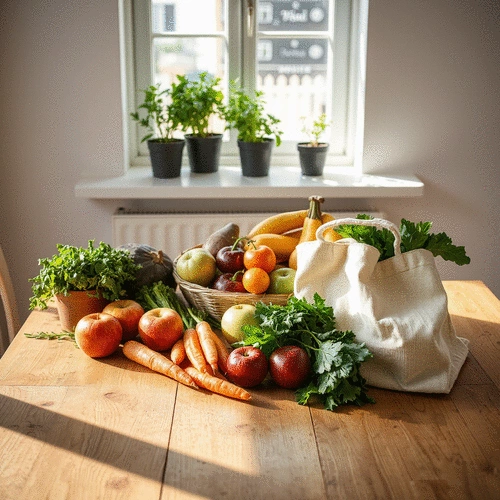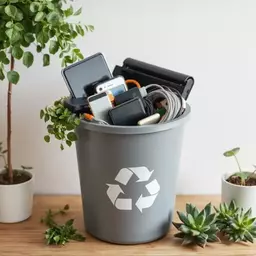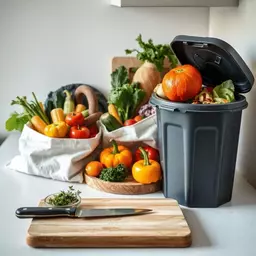In a world where consumerism reigns supreme, making intentional choices matters more than ever. Mindful consumption is not just a trend; it's a lifestyle that can lead to a healthier planet and a more fulfilling life. As you embark on this journey, consider how your purchasing decisions resonate with your values and impact your community.
What You Will Learn
- Understanding mindful consumption involves being aware of the environmental and societal impacts of your purchasing decisions.
- Adopting mindful spending habits can lead to reduced waste, financial savings, and increased satisfaction with quality over quantity.
- Minimalism complements mindful consumption by encouraging you to focus on valuable items that bring joy and fulfillment.
- Incremental changes in your consumption behavior can collectively lead to significant positive impacts on the environment.
- Setting realistic goals for sustainable living helps maintain motivation and accountability in your mindful consumption journey.
- Engaging with your community through workshops and events enhances your knowledge and supports your journey towards mindful consumption.
- Utilizing resources like budgeting apps, blogs, and local initiatives can help you stay committed to a lifestyle of mindfulness and sustainability.
- Exploring community-supported agriculture offers access to fresh produce while supporting local farmers and reducing your carbon footprint.
Benefits of Mindful Consumption
Embracing mindful consumption offers several key advantages that positively impact both individual well-being and the environment:
Reduced Waste
By purchasing only what we need, we significantly decrease the amount of waste going into landfills.
Financial Savings
Mindful consumption often leads to smarter budgeting and significant savings over time.
Increased Satisfaction
Choosing quality over quantity often leads to greater joy in our possessions.
Understanding Mindful Consumption and Its Importance
Have you ever found yourself staring at a shopping cart full of items, questioning if you truly need any of them? You're not alone! Understanding mindful consumption is essential in today's consumer-driven world. It’s about making deliberate choices that align with your values and contribute positively to the environment, your wallet, and your well-being. For more insights on this topic, explore our guide on mindful consumption for sustainable living.
Mindful consumption is a practice that encourages individuals to think critically about their purchasing habits. Instead of buying items on impulse, we take a moment to reflect on our needs and the effects our choices have on the planet. This approach not only helps reduce waste but also fosters a more meaningful connection to the products we choose to bring into our lives.
Defining Mindful Consumption: A Sustainable Approach
At its core, mindful consumption involves awareness and intentionality in purchasing decisions. It means recognizing the impact of our choices on the environment, society, and our personal finances. By adopting this sustainable approach, we can significantly lower our ecological footprints while still enjoying a fulfilling lifestyle.
Mindful consumption encourages us to ask ourselves critical questions before making a purchase, such as:
- Is this product necessary for my daily life?
- How has this item been produced?
- What will happen to it once I’m done using it?
The Benefits of Adopting Mindful Spending Habits
When we embrace mindful spending habits, the benefits are numerous! Not only do we make responsible choices, but we also enhance our overall well-being. Here are a few key advantages of adopting these habits:
- Reduced Waste: By purchasing only what we need, we help decrease the amount of waste going into landfills.
- Financial Savings: Mindful consumption often leads to smarter budgeting and significant savings over time.
- Increased Satisfaction: By choosing quality over quantity, we often find greater joy in our possessions.
At Eco Habits Daily, I firmly believe that every small change counts! By adopting mindful spending practices, we can work towards a more sustainable future while enjoying the journey. It’s all about recognizing that our choices matter and that even little steps can lead to big changes. For more tips on reducing waste, check out our article on eco-friendly junk removal.
Exploring the Concept of Minimalism
Minimalism is closely tied to mindful consumption; it encourages us to focus on what truly matters in our lives. By decluttering our spaces and removing excess, we make room for the things that bring us joy and fulfillment. This doesn’t mean living with nothing; instead, it's about curating a collection of valuable items that enhance our lives.
Here are some tips to get started with minimalism:
- Assess your belongings: Determine what items you truly need and love.
- Set limits: Decide on a maximum number of similar items, like shoes or books.
- Practice gratitude: Appreciate what you have instead of constantly seeking more.
Pro Tip
To deepen your mindful consumption practices, try implementing a "30-Day No Buy Challenge." For one month, commit to not purchasing non-essential items. This exercise can help you identify your true needs, reduce impulse buying, and foster a greater appreciation for what you already own.
Reflecting on Your Mindful Consumption Journey
Our journey towards mindful consumption is not a sprint; it's a series of small, thoughtful steps. Each change we make can feel like a victory, no matter how small. I encourage you to take a moment to reflect on what you've already accomplished! It's essential to recognize that even incremental changes in our consumption behavior can lead to significant impacts over time. You can find more helpful advice on easy eco-friendly habits to start.
When we think about our habits, it's helpful to realize that shifting our mindset might take some time. Instead of aiming for perfection, let’s focus on gradual improvements. Perhaps you’ve started choosing a reusable bag for your groceries or even began making your own cleaning products. Celebrating these milestones keeps us motivated to continue on this path.
The Importance of Incremental Changes in Consumption Behavior
Making a difference often starts small. Here are some simple but effective incremental changes you can incorporate into your daily life:
- Switching from plastic straws to reusable ones.
- Bringing your own container for takeout food.
- Opting for digital receipts instead of paper ones.
- Turning off lights when leaving a room.
These changes might seem minor, but when adopted collectively, they can create a ripple effect of positive behavior in our communities. Remember, each step forward is a step towards a healthier planet!
Setting Realistic Goals for Sustainable Living
As we embrace mindful consumption, it's crucial to set realistic goals. Having clear, achievable objectives can guide us in our journey. Here are some tips for goal-setting:
- Identify a specific area to focus on, like reducing single-use plastics.
- Start with one sustainable habit each month.
- Track your progress to see how far you've come.
In my experience, sharing these goals with friends or family can boost accountability. When you make your journey visible, it not only inspires you but may also encourage others to join you! And remember, it’s okay to adjust your goals as you grow and learn more about sustainable living.
Encouraging Community Engagement and Continuous Learning
Engaging with our community is a powerful way to enhance our journey of mindful consumption. By learning from each other and sharing experiences, we create a supportive network. Plus, community engagement can bring about exciting new ideas and practices that might not have crossed our minds! For more insights, consider exploring mindful eco-friendly living tips.
Participating in local events helps increase our knowledge base. Workshops, where we can learn about everything from composting to sustainable fashion, are fantastic opportunities. They allow us to connect with like-minded individuals, making the journey feel less daunting.
Participating in Mindful Consumption Workshops and Events
Here are some *benefits* of attending workshops and events on mindful consumption:
- Access to expert knowledge on sustainable practices.
- Networking opportunities with other eco-conscious individuals.
- Hands-on experience with sustainable products and practices.
Remember, the more we learn, the more effective we can be in our efforts! These workshops provide us with tools to make impactful changes in our lives.
Sharing Your Experiences: Building a Network of Mindful Consumers
Sharing our experiences can foster a sense of community. Start a conversation with friends about your mindful consumption journey! Here are some ways to share:
- Host a gathering to discuss sustainable living ideas.
- Use social media to inspire others with tips and stories.
- Join online forums dedicated to eco-conscious living.
When we share our successes and challenges, we create a community that supports each other. At Eco Habits Daily, we believe that everyone can make a difference by embracing mindful habits together.
Take Action: Start Your Mindful Consumption Journey Today
Are you ready to take action? There's no better time than now to start your mindful consumption journey! Remember, every step, no matter how small, can lead to lasting change.
Joining local initiatives or online communities can provide additional support. You might find groups that align with your values and can help you stay motivated as you navigate this new lifestyle. Don’t hesitate to reach out!
Join Local Initiatives and Online Communities
Here are some great ways to engage:
- Sign up for community clean-up events.
- Join local gardening clubs or co-ops.
- Participate in forums focused on sustainable living practices.
Community involvement can make your journey feel richer and more connected. Plus, you’ll meet wonderful people who share your passion for the planet!
Utilize Resources and Tools to Stay Committed to Mindfulness
Staying committed to mindful consumption requires resources and tools. Here are some helpful options:
- Download budgeting apps to track spending and savings.
- Follow blogs or podcasts dedicated to sustainable living.
- Read books on minimalism and eco-friendly practices.
By utilizing these tools, you'll find it easier to stay on track and continue evolving your habits. At Eco Habits Daily, we’re here to provide you with guidance and support as you embark on this fulfilling journey!
Exploring Community-Supported Agriculture and Local Sourcing
One of the best ways to enhance your mindful consumption journey is through community-supported agriculture (CSA). Joining a CSA can give you access to fresh, local produce while supporting nearby farmers. Plus, it’s a fantastic way to engage with your community and learn more about sustainable food practices.
Consider visiting local farmers’ markets or food co-ops to explore options. You’ll be surprised by how many options are available right in your neighborhood! Supporting local businesses not only boosts the economy but also reduces your carbon footprint.
Frequently Asked Questions About Mindful Consumption
- What is mindful consumption?
- Mindful consumption is the practice of making deliberate purchasing choices that align with your values and positively impact the environment, your finances, and your well-being. It involves thinking critically about what you buy and its broader implications.
- How does mindful consumption reduce waste?
- By focusing on purchasing only what you truly need and prioritizing quality over quantity, mindful consumption naturally leads to less unnecessary consumption, thus reducing the amount of waste sent to landfills.
- What are the financial benefits of mindful spending?
- Mindful spending encourages smarter budgeting, impulse control, and a focus on essential purchases. This often results in significant financial savings over time as you avoid wasteful spending on items you don't truly need or value.
- How is minimalism related to mindful consumption?
- Minimalism complements mindful consumption by encouraging you to declutter and curate your possessions, focusing on items that bring genuine joy and utility. It's about valuing experiences and essential items over excessive material possessions.
- What are some easy ways to start practicing mindful consumption?
- You can start by making incremental changes such as using reusable bags, bringing your own coffee cup, opting for digital receipts, supporting local businesses, and taking a "no-buy" challenge for non-essential items.
- How can community engagement help my mindful consumption journey?
- Engaging with local initiatives, workshops, and online communities provides a supportive network, access to expert knowledge, and opportunities to share experiences, making your journey more enriching and sustainable.
Recap of Key Points
Here is a quick recap of the important points discussed in the article:
- Mindful Consumption: Make deliberate choices that align with your values and contribute positively to the environment.
- Critical Questions: Reflect on the necessity, production, and disposal of products before purchasing.
- Benefits of Mindful Spending: Reduced waste, financial savings, and increased satisfaction by choosing quality over quantity.
- Embrace Minimalism: Focus on what truly matters by decluttering and curating valuable items.
- Incremental Changes: Adopt small, sustainable habits like using reusable bags or containers.
- Realistic Goals: Set achievable objectives to guide your journey towards mindful consumption.
- Community Engagement: Participate in local events and workshops to learn and share experiences.
- Utilize Resources: Use apps, blogs, and books to stay committed to your mindful consumption journey.










